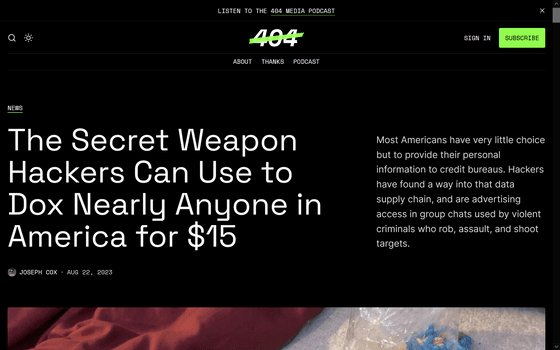It is pointed out that personal information collected by credit card companies has been spread to criminals through credit information agencies and brokers

The information registered by the customer with the credit card company is collected through the credit information agency and used to check the ability to pay. According to a survey by 404 Media, an American news media, regarding the distribution of such information, this type of personal information is easy prey for criminals, and depending on the information, it is sold at a low price of several thousand yen. It turns out.
The Secret Weapon Hackers Can Use to Dox Nearly Anyone in America for $15

404 Media's Joseph Cox recorded when he joined the criminal community through the messaging app Telegram that he wanted to know very little information about the target, such as his name and the state in which he believed he lived. By simply telling the bot, he was able to get all kinds of information about the target, including names, phone numbers, social security numbers, address history, family names and dates of birth. All of this data is sold in Bitcoin, and it seems that it was handled at a price of about $ 15 (about 2200 yen) to $ 40 (about 5800 yen).
Such information can be used for a variety of purposes, such as 'swatting,' sending special forces to innocent people's homes, 'SIM swapping,' hijacking SIM cards, or simply going to a person's home and committing a crime such as violence. It is said that it is used. The bots that Cox confirmed are so powerful that they require little advanced technology to obtain sensitive data, making it difficult for users to prevent information leakage.
404 Media points out that all of this personal information is leaked from credit card companies.

According to Federal Reserve Board (FRB)
However, some credit bureaus make such data available to other companies. Credit reports that describe card usage history etc. are limited in use based on the law called ' Fair Credit Reporting Act (FCRA) ', but name, date of birth, current address, previous address, social security number, telephone Basic information such as numbers are not subject to restrictions under applicable law.
Credit information agencies and data brokers maintain the stance that such basic information falls under the Gramm-Leach-Bliley Act , which permits the integration of the banking, securities, and insurance industries. Cox points out that they are 'selling information to Basic information is sold to a wide range of customers, such as private detective agencies and the real estate industry, and it is said that somewhere along the way information is distributed through brokers, there is an opening for criminals to take advantage of.

The data acquisition route of criminals seems to change over time, and for a while, the data analysis tool
``For ordinary consumers, it is very difficult to get credit bureaus to stop selling data to third parties, and it is probably impossible to completely delete the data,'' 404 Media said. At the same time, quoting lawyer Julie Mao as the words of those who carry out privacy campaigns, 'The solution is to stop the flow of information from credit bureaus, and the fundamental reason is that this information is being bought and sold in the first place. It's a problem. If consumers don't have the choice to protect their privacy, it's important that government agencies do so instead.' Mao believes that if basic information can be included in the FCRA, sales can be restricted.

Confirming 404 Media's report, Senator Ron Wyden said, 'Governments need to stop companies from selling personal information. Executives who put profit before national security and the safety of Americans are should be punished accordingly,' he said.
Related Posts:
in Security, Posted by log1p_kr







